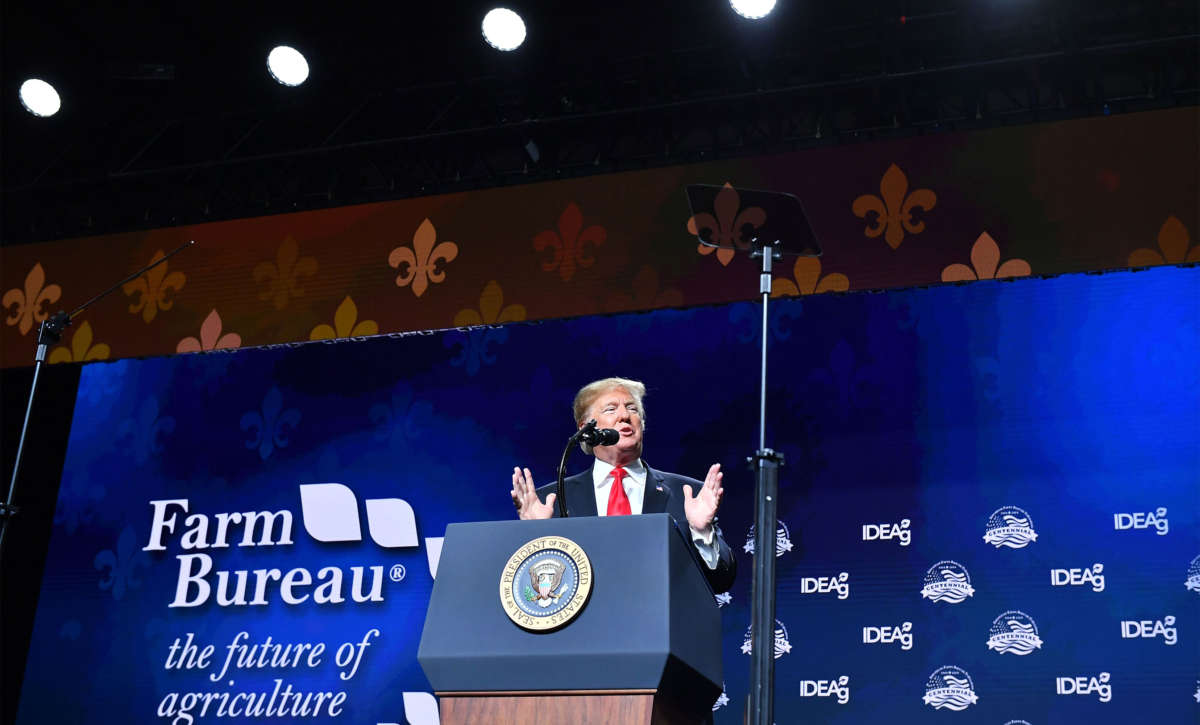Did you know that Truthout is a nonprofit and independently funded by readers like you? If you value what we do, please support our work with a donation.
On Thursday, Donald Trump’s Environmental Protection Agency finalized its new rules to dramatically reduce the number of waterways previously protected from harmful pollution and runoff under the Clean Water Act (CWA). These rules replaced the Obama-era Waters of the U.S. (WOTUS), or Clean Water Rule, an executive order that redefined and expanded the term “waters of the U.S.” in the CWA to include streams and wetlands.
News outlets like The New York Times and the Washington Post have framed the new rules as a win for farmers — a stance that Trump himself has pushed. In a speech at this past weekend’s American Farm Bureau Federation conference, Trump called WOTUS “disastrous” and claimed that it “basically took your property away from you” — a flagrantly untrue statement. The argument from Trump’s administration and the conservative, industry-friendly Farm Bureau is that the recently-repealed WOTUS was regulatory overreach.
Though it’s controversial among big farmers, in reality, the WOTUS rule affects two favorite industries of the president far more than it does agriculture. Andrew Rosenberg, director of the Center for Science and Democracy at the Union of Concerned Scientists, says the new rules have “nothing to do with farmers — it’s about oil and gas and big developers.” The complaints alleging WOTUS is bad for farmers, he says, are “nonsense.”
Most farmers were largely unaffected by Obama’s WOTUS because it maintained exceptions for regular agricultural practices that were already exempt under the original Clean Water Act. In fact, a 2016 study found that the EPA’s farm jurisdiction is actually more limited under the 2015 WOTUS order.
Even under the rules before 2015, farmers were hardly impacted by the pollution control regulations set under the Clean Water Act, as found by Trump’s own administration. As reported by MarketWatch, a report released by the EPA in 2018 shows that, from 2011-2015, over 3,000 permits were filed under the clean water act to dredge, fill or otherwise impact wetlands and waterways protected under the WOTUS rule. Of those permits, an average of eight per year were from agriculture.
The new regulation, however, rolls back protections that even pre-date the 2015 rule — protections that have been in place since the Clean Water Act was passed in 1972. The definition of waterways that receive federal oversight are much narrower now; millions of miles of streams and about half of the wetlands in the country will be removed from protection. It’s the largest rollback of the Clean Water Act since it was passed.
The real winners of this rollback are not individual farmers, then, but just the same industry players that are benefiting from the slew of environmental rules that are being rewritten or eliminated under Trump. “If you’re at the top of the corporate ladder and you really don’t care about the impact of your business, you only care about maximizing the bottom line, irrespective of the impacts — these are dream years,” says Rosenberg. It’s no coincidence that, while Trump’s packed his cabinet with people with deep ties to the oil and gas industry, he’s also been passing regulations that help big corporations and polluters.
According to a poll from the Farm Journal, farmers largely approve of Trump, convinced he’s on their side. But his actions while he’s been in office show that many of his decisions are actually harming farmers. The climate crisis, which Trump derides action on, is making a challenging environment for farming.
On top of harm for farmers in general, Trump has made it harder for small, non-corporate farmers specifically. Small farmers have already been struggling to hold on for the last decade or so. On top of that, recent flood events in the Midwest have washed away acres of crops, ruining entire years. Rosenberg says rollbacks on pesticide restrictions; implementation of cooperative enforcement, which allows the industry to regulate itself; tariffs imposed by Trump’s trade deals; even ending free school lunches that had crops provided by vegetable farmers are all actions that hurt the small farmer and help the corporate farmer — in turn boosting the corporations and big agribusiness.
The Farm Bureau is also on the side of big agriculture, and continually lobbies for benefits for big commodity farming. Its interests align closely with the fossil fuel industry. So the “rousing applause” that Trump experienced, according to the New York Times, at the Farm Bureau conference is no surprise.
His speech on Sunday, right before his administration was about to release the changes to the CWA, was timed strategically. The support from the Farm Bureau crowd would color the news, compelling the aforementioned news outlets to characterize the rollbacks as a victory for all farmers — and they did. The strategy worked. And readers were none the wiser.
Press freedom is under attack
As Trump cracks down on political speech, independent media is increasingly necessary.
Truthout produces reporting you won’t see in the mainstream: journalism from the frontlines of global conflict, interviews with grassroots movement leaders, high-quality legal analysis and more.
Our work is possible thanks to reader support. Help Truthout catalyze change and social justice — make a tax-deductible monthly or one-time donation today.
